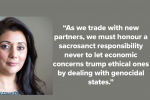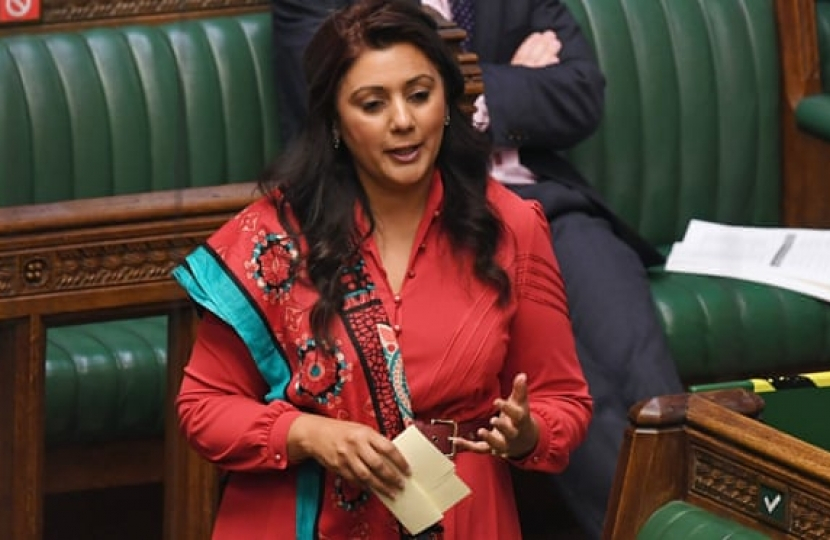
Please see below the articles I have written on the New Genocide Amendment and why Britain has an obligation to stand up against all tyrannical governments. All articles are also attached as PDFs at the bottom of this page.
Regimes that commit genocide must not be rewarded with trade deals - The Telegraph, 6 February 2021
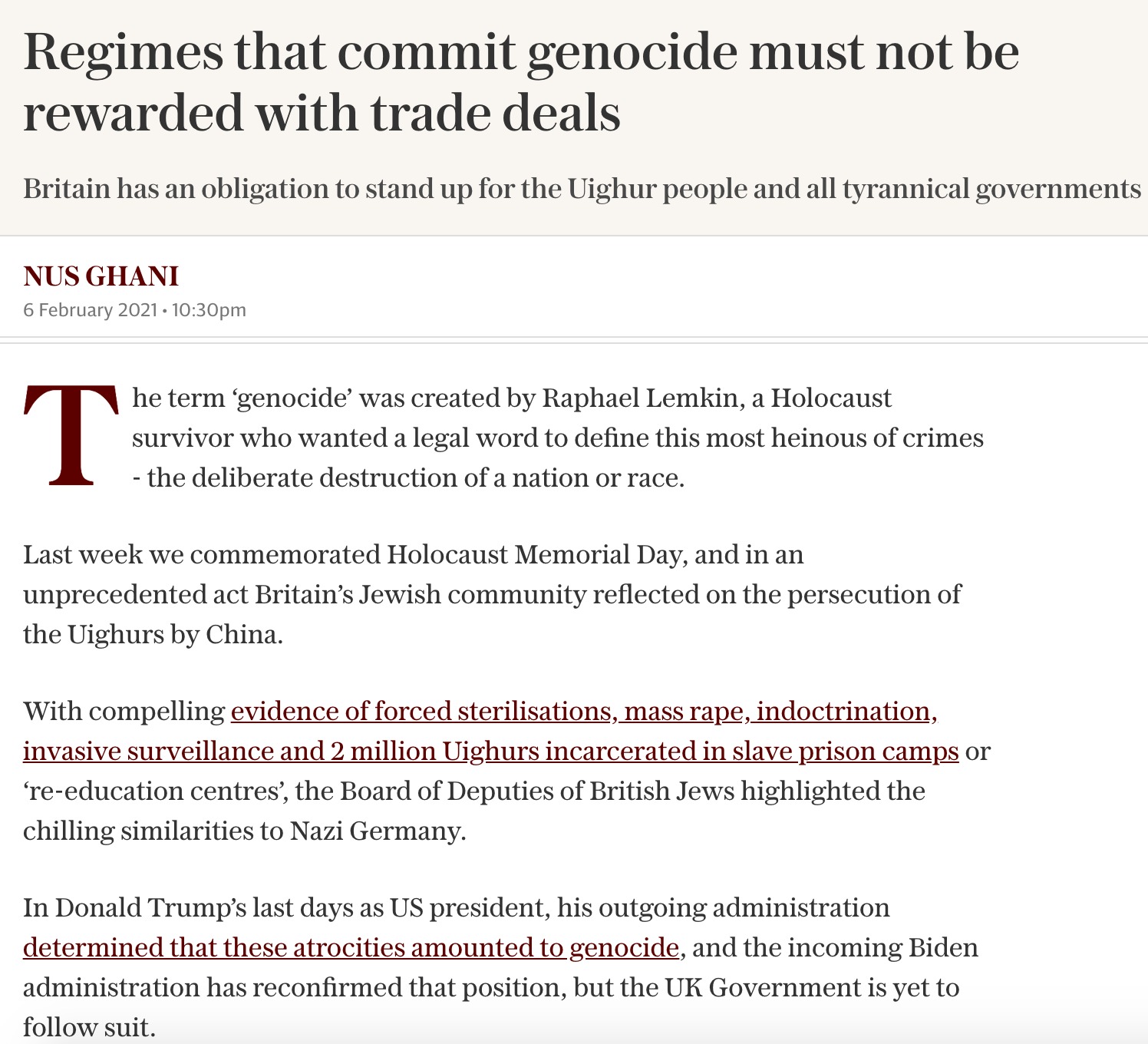
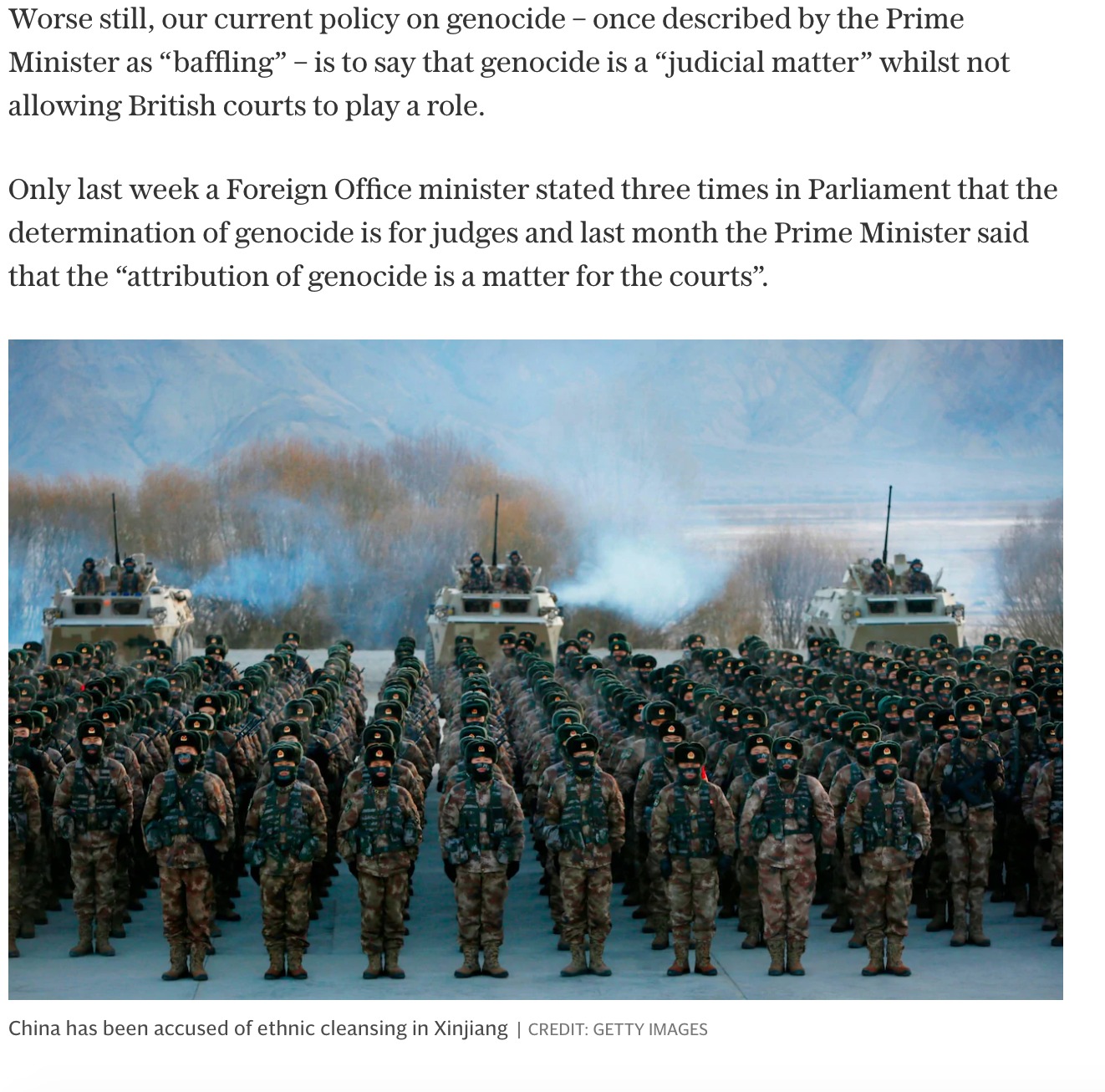
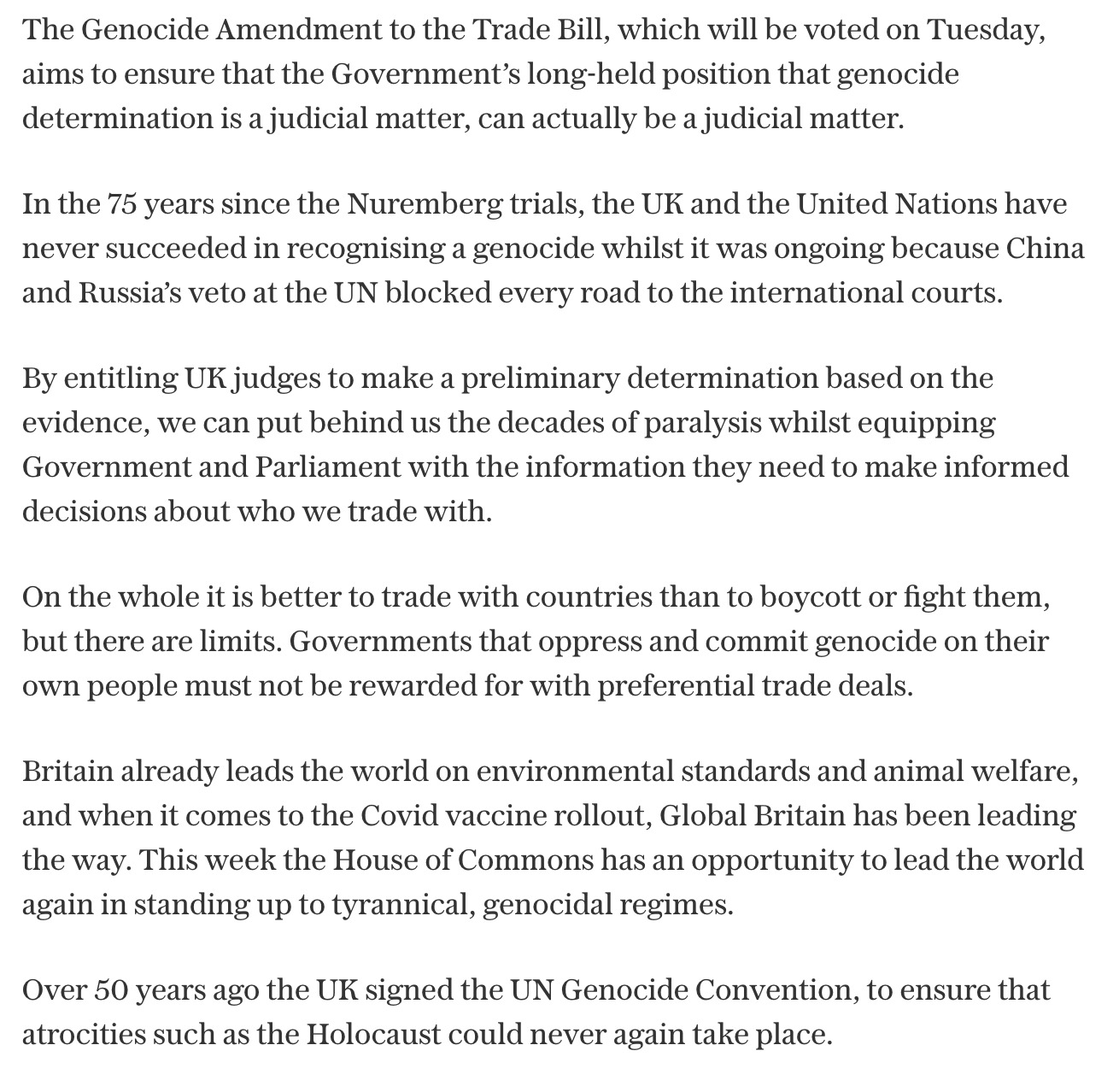
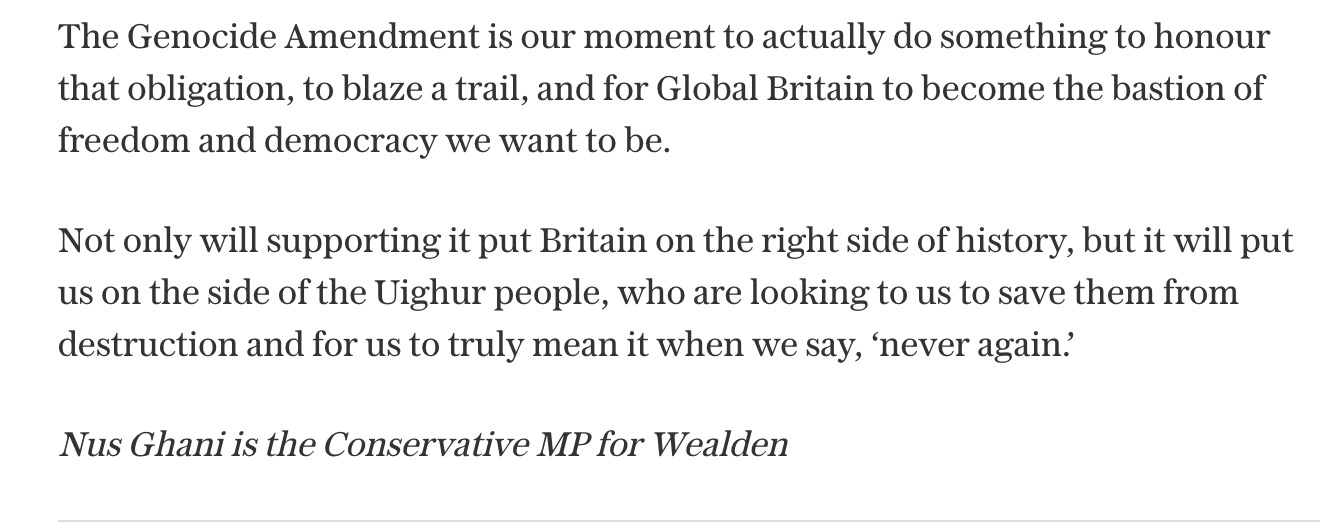
China and genocide. Our new proposal answers Ministers’ objections. So they should support it. - Conservative Home, 4 February 2021
In Donald Trump’s last days as President, his outgoing administration did something particularly bold. In determining that China has committed “genocide and crimes against humanity” in its repression of the Uighurs in Xinjiang, the eyes of the world are now focusing on the appalling atrocities that have gone on for far too long.
Two million Uighurs and other minorities have been forced into slave labour prisons and camps in Xinjiang’s cotton fields, with state organised violation and abuse of women, as well as forced sterilisations.
But while the US has repeatedly acted decisively – including with its own Uyghur Human Rights Policy Act – and decided that they have enough evidence to act, the UK has found itself languishing on the sidelines. This is not where Global Britain ought to be.
The UK has entered a new era. We have left the EU and taken back control of our laws and our trade policy. We should be using this freedom to make our mark in the world, and to play an active part in the global civic community – not to retreat into isolationism and irrelevance.
With Joe Biden as America’s President and Britain soon to take on the presidency of the G7, now is the time for us to show what post-Brexit Britain is really about.
It’s entirely understandable that the Government wants to be exceptionally cautious about using the term “genocide”. It is the most heinous of crimes, and the term should not be used inaccurately or lightly. But it is maintaining a policy on genocide that is, by its very nature, fundamentally dishonest, and which ensures that Britain will always look the other way when a genocide is ongoing.
The UK position has always been that “genocide is a judicial matter” – as stated once again by the Prime Minister last week in the Commons. And the court we defer to is the International Criminal Court (ICC).
But everybody knows, including Government ministers, that the ICC is in a state of frozen paralysis – held hostage by Russia and China’s veto at the United Nations. The UN is simply incapable of holding genocidal states to account.
So I am suggesting an amendment to the Trade Bill that brings to an end this incoherence, and allows a UK court to be able to play a role in this decision instead, given the ICC’s inability to. And I’m delighted that the Lords has listened to concerns raised by MPs on all sides of the House, and has returned us a New Genocide Amendment which we will be debating next week.
Rather than say that genocide is a matter for international law, knowing full well that it is paralysed by global politics, we must give British courts a role instead. It is the only way to make sure that the Government’s policy on genocide actually does anything.
The Government can’t have it both ways. Ministers can’t come to the despatch box saying genocide is a “judicial decision”, but then ban the courts from making even a preliminary decision.
The so-called “genocide amendment” is so desperately needed because China and Russia are making a mockery of the international legal order. In the 75 years since the Nuremberg trials, the UK and the UN have never succeeded in recognising a genocide whilst it was ongoing. And if we don’t adopt the genocide amendment, China and Russia will continue to make a mockery of our domestic law too, and we will be outsourcing to them all future decisions on genocide.
I know that some of our colleagues were desperate to support it, in both the Lords and Commons, and know it’s the right thing to do. Some were worried about UK courts being clogged up with vexatious or improper claims, despite the fact that British judges are some of the most experienced and respected in the world.
And some were concerned that the courts might be able to strike down trade deals, or that this new law might erode parliamentary sovereignty. That would of course be unconstitutional and improper.
The beauty of the New Genocide Amendment is that it addresses all of these concerns and we have conceded to Government objections. So the only question to ask now is given that the New Genocide Amendment is the compromise, what is the Government’s objection now?
When the Commons comes to debate this one final time, we all have a very simple choice to make. Do we want the UK to be handcuffed by Russia and China when it comes to genocide, or do we want to take back control and empower ourselves to actually do something?
Over 50 years ago the UK signed the UN Genocide Convention, to ensure that atrocities like the Holocaust could ‘never again’ take place. It’s time we stood by the international rule of law, promoted our hard won values and standards across the world and showed what British values are about.
Brexit wasn’t a vote for Britain to pursue isolationist policies, to pull up the drawbridge or to downgrade our values. We are not a country that will ever want to enrich itself on the back of slave labour, or to use its new found freedom to trade with states that commit and profit from genocide. Britain is better than that.
Brexit was a vote, full of hope and optimism, which said that Britain should play its part in leading the global world order, rather than having the EU set our values for us. Unless we shift this cavalier attitude on genocide aside, we will continue to shrink on the world stage and our influence will wane.
It’s time for Britain to be on the right side of history.
The UK should be empowered not to trade with regimes overseeing genocide - The Times, 11 January 2021
Fifty-one years ago the United Kingdom signed up to the UN Genocide Convention, designed to ensure that atrocities like those that happened during the Second World War could “never again” take place.
Yet since then at least half a million people were killed during the 1994 Rwandan genocide, over a million died in the genocide in Bangladesh in the 1970s, 1.7 million people lost their lives in the Cambodian genocide and we have witnessed appalling atrocities by Daesh [Islamic State] against Christians, Yazidis and other ethnic and religious minorities in Iraq and Syria. So why has this landmark treaty done so little to stop atrocities from happening?
Because there’s a vicious circle at the heart of the international legal order which has meant that successive UK governments have found it impossible to act in the face of genocide.
The UK position has always been that the government can only define an incident as a genocide if this has been determined in the International Criminal Court (ICC). The only way anything gets to the ICC is if the UN Security Council sends it there, and China and Russia have the power to veto anything the UN Security Council does.
And this is especially important today given that in China, two million Uighurs and other minorities are being forced into slave labour prisons and camps in Xinjiang’s cotton fields. The horror of mass enslavement of the Uighur continues with state-organised violation and abuse of women and girls who are facing forced sterilisations and a resulting 85 per cent drop in Uighur birth rates. This is a key marker of the UN’s definition of genocide.
Yet our country’s capacity to respond is being handcuffed once again by geopolitics and the fate of so many people depends on Britain playing a leading global role in breaking the logjam.
We have now left the EU and taken back control of our laws and our trade policy so that we can reach out to new trading partners, including some of the fastest growing economies in the world. And never have we needed these freedoms more as we recover from the economic effects of Covid and the government’s response to it. But with this freedom comes both opportunity and responsibility.
An opportunity to use our new independent trade policy as a tool with which to do good — both for our own citizens and people all over the world — and to demonstrate the values global Britain wants to live up to.
Brexit wasn’t a vote for Britain to pursue isolationist policies, to pull up the drawbridge or to downgrade our values. It was a vote, full of hope and optimism, which said that Britain should play its part in leading the global world order, rather than having the EU set our values for us.
So as we form trade deals with new partners, we must honour our sacrosanct responsibility never to let economic concerns trump ethical ones by dealing with genocidal states. If a country is mired in genocide — the crime above all crimes — Britain must not be complicit.
So I am supporting a small but significant change to the government’s trade Bill. Rather than say genocide is a matter for international law, knowing full well that it is paralysed by global politics, this amendment gives British courts a role instead. This is one of the many benefits of taking back control of our own laws and will ensure that the government’s longstanding policy will actually mean something.
If a UK court has seen credible evidence that the crime of genocide is being committed, judges will be able to make a statement to that effect for the government to consider.
It wouldn’t tie the hands of the government — that would be unconstitutional. The government could, if it wished, choose to ignore it, and the courts wouldn’t be able to strike down trade deals or laws. But why on earth wouldn’t the government want to know if a genocide is being committed in a state it was discussing trade with?
Governments around the world have been slow to act. We don’t need more bureaucracy, tokenism, impact assessments or vague and waffly virtue signalling nonsense that doesn’t achieve anything. Britain must affirm the principle that we will never trade with countries that commit genocide, and nor will we look the other way or do business with its perpetrators. Genocide cannot mean business as usual.
As we herald a new dawn with President Joe Biden, and as the UK takes on the presidency of the G7, Britain can blaze a trail and provide leadership to the world, stand by the international rule of law and promote our hard won values and standards.
In the 75 years since the Nuremberg trials, the UK has never succeeded in recognising a genocide while it was ongoing. We now have a chance to put that right.
